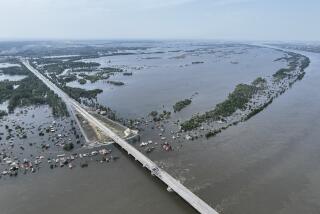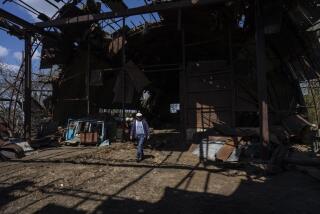Pulp mill’s closure puts a Russian town in peril
BAIKALSK, RUSSIA — Even after the troubles began at the mill, most of the families lingered, clinging to vague hope. As early autumn gave way to snow, they gathered up rumors, pinched pennies and drank a little more than usual.
Their way of life was at risk. The global financial meltdown had succeeded where historic changes and generations of crusading ecologists had failed: It stopped production at the Baikalsk Pulp & Paper Mill, a Soviet relic and environmental menace that serves as the economic lifeline for this town of 17,000.
The mill closure threatens to drive this lonesome town, clinging to the southern shore of Lake Baikal in the great wastes of Siberia, to extinction.
“It seems to me this will soon be a dead town,” said Alexander Shendrik, head of the mill’s union. “Everybody depends upon the plant.”
Built by communism and imperiled by capitalism, the town was founded by Communist Party volunteers who constructed the mill amid the rich timber forest. The pollution-generating factory chugged for decades alongside the oldest, deepest lake on the planet, a vast ecological gem nicknamed the Galapagos of Russia for the rare species it contains.
Through the years, the volunteers started families and meshed into a close-knit working-class community. The mill was privatized with the fall of the Soviet Union, but the lifestyle was little changed. Children went to the plant’s kindergarten; some families lived in factory housing. Even today, the town is run by former Communist Party leaders.
But the mill has long been criticized by both Russian and foreign environmentalists as a dangerous anachronism, a remnant from the days when the Soviet Union rushed to create industry at any cost. A battle has raged for years over whether to shutter the mill to preserve the lake, a UNESCO World Heritage Site.
Because of environmental concerns, the mill had already been forced to adopt a cleaner but costlier mode of production. This was a wan victory for environmentalists, who had wanted to shut the plant altogether, and a blow to workers, who believe their livelihood was put at risk for an abstract ecological threat they consider exaggerated.
Still, the danger of closure didn’t come until pulp prices plunged this year, along with those of other commodities. The mill was operating at a loss, and in September, management issued the first order to halt production.
By now, most of the 2,280 millworkers have been told they are redundant, as the lingo goes, and put on forced leave until early February. They were supposed to draw a percentage of their salaries until then -- average pay is just over $500 a month -- but have been warned not to expect any money in December.
“Some of the people, like us, have nowhere to run,” said Yanina Ilnitskaya, 40, who worked as a translator at the mill.
This town has always run on the clock of the factory; days started and ended with shifts, and families worked together in the drying department, the press, or washing the pulp.
Ilnitskaya came here from Ukraine, married and started a family.
“This is a friendly town, and the life of the people here is very special,” she said, her pale face softening.
“They came from all over the former Soviet Union, and it was a very beautiful town, very green.”
Townspeople are used to the harsh winters that sweep down off the tundra and push over the mountains to Mongolia. They are used to living hand to mouth, and to drowning out ecologists who argue the mill tainted the lake with chlorine runoff.
Resentment toward environmentalists runs deep. People scoff at evidence that their mill is dangerous. They regard the lake as pristine, gulping down its waters and digging into platters of fresh-caught omul, a tender white fish found only in the depths of Baikal.
That distrust has deepened since pulp production stopped, as ecologists lobby the government to keep the mill closed.
Townspeople are pushing in the opposite direction -- they contend that, as a matter of economic survival, they should be allowed to resume the older, dirtier system of paper making.
“We’re watching this process, watching local and federal authorities, and trying to use our influence not to let them give this permission to the paper mill,” said Roman Vazhenkov, head of Greenpeace’s Lake Baikal campaign.
Vazhenkov acknowledged the dire social threat, and said he hoped the government would provide some aid to the people of Baikalsk. Still, he celebrated the work stoppage. “Environmentally, we were very glad about the closure,” he said.
For all the hardships they have grown accustomed to, the people of Baikalsk are not used to being cut adrift. They too are hoping for intervention by the government.
Layoffs are sweeping the country and unemployment is rising along with reports of delayed salaries.
“If the pulp mill closes, the town has nothing to exist on,” Mayor Valery Pintayev said. “We don’t have other enterprises.”
As the global crisis grew and demand for pulp dropped, managers began to warn workers that the mill was no longer turning a profit. After production stopped, the regional government began saying it would drum up investment and create new jobs. Talk spread about luring tourists, or developing a ski resort around the trails carved into the mountains on the edge of town.
Pintayev, who says he is busy trying to secure enough coal to keep residents warm during the winter, is skeptical.
“Given the crisis we have today, these plans are not realistic,” he said.
Workers and managers at the mill believe its fate is already decided. If production doesn’t start soon, the underground pipes will freeze and crack, rendering the factory infrastructure useless.
A sort of melancholy has settled over the town. Rusted satellite dishes yawn on the roofs of apartment blocks. Playground equipment stands buried in snow. In the market, old-timers in fur hats mutter uncertainly about how the town will survive.
A few hundred workers still toil at the plant. They are maintaining the equipment, or running the power plant that sends heat to the town. When they walk homeward through the early Siberian darkness, the townspeople rush from their homes and press them with questions -- What did you hear today? Is there any news? Tell us.
“Now they only buy the most necessary things, bread and milk,” said grocery clerk Lyubov Stafiyevskaya, passing a gray afternoon behind the cash register of a deserted store. “The men are drinking more because they have nothing else to do.”
By 3:30, dusk is coming down, and gaudy streaks of pink, yellow and orange glow over a frozen landscape.
Nervous families spend their days huddled inside. Svetlana Brovkin was born here to a family of factory workers. Her father helped build the paper plant; then stayed on, along with his wife, to work.
In 1988, she met and fell in love with a young man on a visiting construction crew. Soon they were married, and her husband, Alexander Brovkin, had joined her at the plant. “We have been fully happy here,” he said wistfully.
Now the couple and their 19-year-old son have been laid off. They disconnected the Internet and cut all long-distance service. Their sitting room is dim because, to save money, they unscrewed all but one bulb from the light fixture.
When they confess to this frugality, Svetlana Brovkin blinks away tears; her husband tightens his jaw and flushes. The first order to stop work, Svetlana says, “sent goose bumps over my skin.”
Svetlana shows her root cellar, brimming with jars of pickled vegetables from their small plot of land. At least the family won’t starve over the long winter, she points out grimly. If summer comes without work, they will be forced to split up -- her husband and teenage son will look for jobs elsewhere, while she and her younger son stay behind to grow and preserve another summer’s worth of crops.
The idea of moving away from Baikalsk frightens her.
“There’s no place for us to go,” she says. “Nobody’s waiting for us. Nobody’s expecting us.”
--
More to Read
Sign up for Essential California
The most important California stories and recommendations in your inbox every morning.
You may occasionally receive promotional content from the Los Angeles Times.










